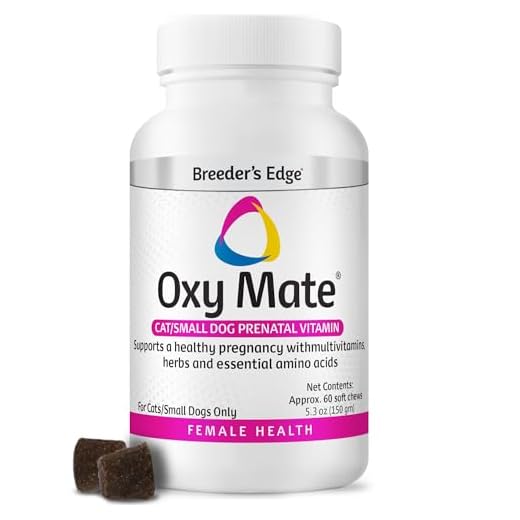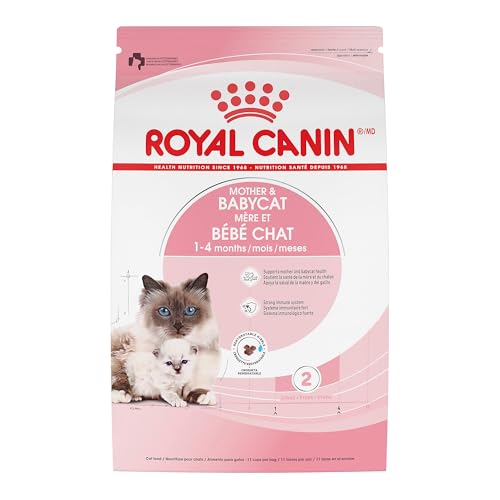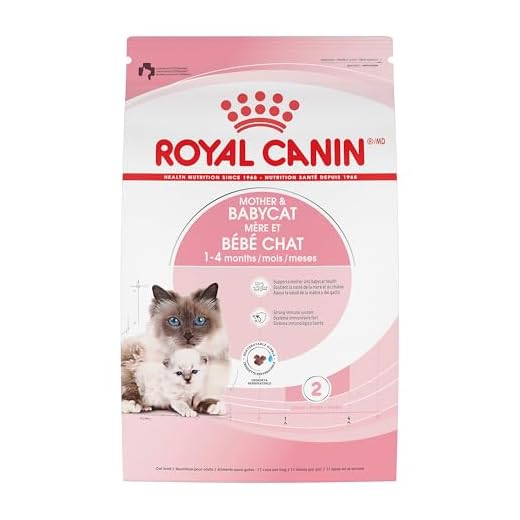



High-quality, protein-rich meals are non-negotiable for a mother-to-be. Look for ingredients like chicken, fish, or turkey in the food you choose, ensuring these sources are the primary components. A good rule of thumb is to select a formula specifically designed for growth and reproduction.
Incorporate wet food into the diet to enhance hydration and palatability. The added moisture can make a significant difference in overall health, especially during this critical time. Aim for a balanced mix of dry and canned options to provide varied textures and flavors.
Don’t overlook the importance of vitamins and minerals. Nutritional supplements containing calcium, DHA, and folic acid can support the development of healthy kittens. Consult with a veterinarian to determine the right balance and any additional nutrients that may be beneficial.
Frequent, smaller meals can aid digestion and keep energy levels stable. Instead of sticking to the standard feeding schedule, offer multiple small portions throughout the day to accommodate the increased nutritional needs.
Understanding Nutritional Needs During Pregnancy
For a feline expecting kittens, a diet high in protein and fat is paramount. This phase demands increased caloric intake to support the developing embryos. Incorporating premium wet food can significantly enhance hydration and nutrient absorption, which is vital during this time. Specific formulations designed for gestating females often contain the right balance of vitamins and minerals, ensuring optimal health for both the mother and her offspring.
Protein-Rich Foods
Lean meats, such as chicken and turkey, provide essential amino acids necessary for fetal development. Additionally, fish can be a great option, but always ensure it’s safe and free from harmful additives. For a delicious treat, consider adding best tuna broth for cats to her meals to enhance flavor and moisture content.
Hydration is Key
Staying hydrated is critical. Fresh water should always be available, and moist food can help meet her liquid needs. Monitoring her hydration levels can prevent complications and support overall well-being during this important time.
Choosing High-Quality Food for Expecting Felines
Opt for premium brands that focus on high protein and essential nutrients tailored for mothers-to-be. Look for formulations specifically designed for reproduction or growth stages, as these often contain higher levels of calories, protein, and fat.
Key Ingredients to Seek
- Animal protein: Chicken, turkey, or fish should be the first ingredient. This ensures your furry friend gets the necessary amino acids for healthy development.
- Healthy fats: Omega-3 and Omega-6 fatty acids are crucial for brain and eye development in kittens.
- Vitamins and minerals: Look for added calcium, phosphorus, and vitamins A, D, and E which support both the mama and her little ones.
- Digestive health: Probiotics and prebiotics can help maintain a healthy gut, which is beneficial during this sensitive time.
Brands to Consider
- Royal Canin Mother & Babycat – specifically formulated for queens and their kittens.
- Hill’s Science Diet Kitten – provides all the necessary nutrients for growth and reproduction.
- Wellness CORE Grain-Free – packed with protein and free from artificial additives.
- Purina Pro Plan Kitten – offers a balanced diet that supports both the mother and her developing babies.
Always consult with a veterinarian before making any dietary changes, as they can provide personalized recommendations based on specific health needs. Regularly monitoring weight and overall health will ensure that everyone remains healthy and happy throughout this exciting phase of life.
Importance of Protein and Fat in a Pregnant Cat’s Diet
High protein intake is non-negotiable for felines expecting litters. Aim for at least 30-40% protein in the daily diet. This macronutrient supports fetal development and helps maintain muscle mass in the mother. Quality sources like chicken, turkey, and fish should be prioritized to ensure all amino acids are present.
Moreover, fat is equally significant. A diet comprising 20-25% fat provides the necessary energy and aids in the absorption of fat-soluble vitamins. It’s crucial for the energy demands of both the mother and her developing kittens. Look for healthy fats such as those found in fish oil and chicken fat, which also contribute to healthy skin and coat condition.
| Nutrient | Recommended Percentage | Sources |
|---|---|---|
| Protein | 30-40% | Chicken, Turkey, Fish |
| Fat | 20-25% | Fish Oil, Chicken Fat |
Incorporating these macronutrients in appropriate proportions ensures optimal health for both the mother and her kittens. For a sustainable approach, consider wet food options as they often contain higher protein and fat percentages compared to dry kibble.
Supplements and Vitamins for Expecting Felines
For a healthy experience during this special time, adding certain supplements can significantly benefit overall well-being. Omega-3 fatty acids, such as those found in fish oil, enhance brain development in kittens and support skin health. Consider incorporating a high-quality fish oil supplement into the daily routine.
Key Vitamins
Vitamin E plays a pivotal role in maintaining reproductive health, while B vitamins are essential for energy and overall vitality. Ensure that the diet includes a balanced multivitamin designed specifically for felines, containing these important nutrients.
Minerals Matter
Calcium and phosphorus are critical for developing strong bones in offspring. A supplement rich in these minerals can help avoid deficiencies. Always consult with a veterinarian before introducing new products to the daily regimen. Remember, proper nutrition is paramount for the well-being of both mother and her kittens.
For a clean environment while caring for them, using the best pressure washer for graffiti removal will be beneficial.
Feeding Schedule Adjustments for Expecting Felines
Adjusting meal frequency is vital as gestation progresses. Initially, I recommend offering smaller meals four to five times a day. This helps manage any nausea and ensures consistent energy levels. As the weeks go by, gradually increase the portion sizes while maintaining the same frequency to accommodate growing nutritional requirements.
Timing and Consistency
Feeding at the same times daily creates a sense of routine. It’s beneficial for mood and helps regulate appetite. I suggest monitoring activity levels and adjusting meal times accordingly. If your feline seems hungrier at specific times, don’t hesitate to tweak the schedule.
Hydration Matters
Fresh water should always be accessible. Hydration is key, especially as the body works harder during this period. Consider placing multiple bowls around the home to encourage drinking, as some might prefer different locations. Keep an eye on water intake; dehydration can lead to complications.
Lastly, consult with a vet for personalized guidance on any specific changes, especially if unusual behaviors arise. Adjusting the feeding schedule thoughtfully can significantly impact well-being during this crucial time.
Common Foods to Avoid During Feline Pregnancy
Raw eggs pose a risk due to the potential presence of Salmonella or E. coli, which can harm both the mother and her kittens. Cooked eggs are safe, but stick to moderation.
Certain fish varieties, especially those high in mercury like tuna, should be limited. Mercury can accumulate and lead to neurological issues in developing kittens.
Onions and garlic are toxic. Even small amounts can damage red blood cells and lead to anemia, so they must be completely excluded from any meal plan.
Dairy products often cause digestive upset. While some felines may tolerate small amounts, it’s best to avoid them to prevent gastrointestinal issues.
Chocolate is highly toxic due to theobromine. Any form of chocolate, including baked goods, must be kept out of reach to prevent serious health complications.
Highly processed foods, including those with artificial additives and preservatives, can lead to health problems. Opt for natural, whole food options instead.
Alcohol is extremely dangerous and can lead to severe poisoning. Even tiny amounts can have fatal consequences.
Raw meat can harbor harmful bacteria like Salmonella or Listeria. Always ensure meat is thoroughly cooked to eliminate these risks.
Exotic meats, such as those that are game or wild, may carry parasites or diseases. It’s safer to stick with commercially prepared cat food designed for mothers in this state.
Lastly, avoid excessive treats that are high in sugars or fats. These can lead to obesity and health issues, which are detrimental during this crucial time.









